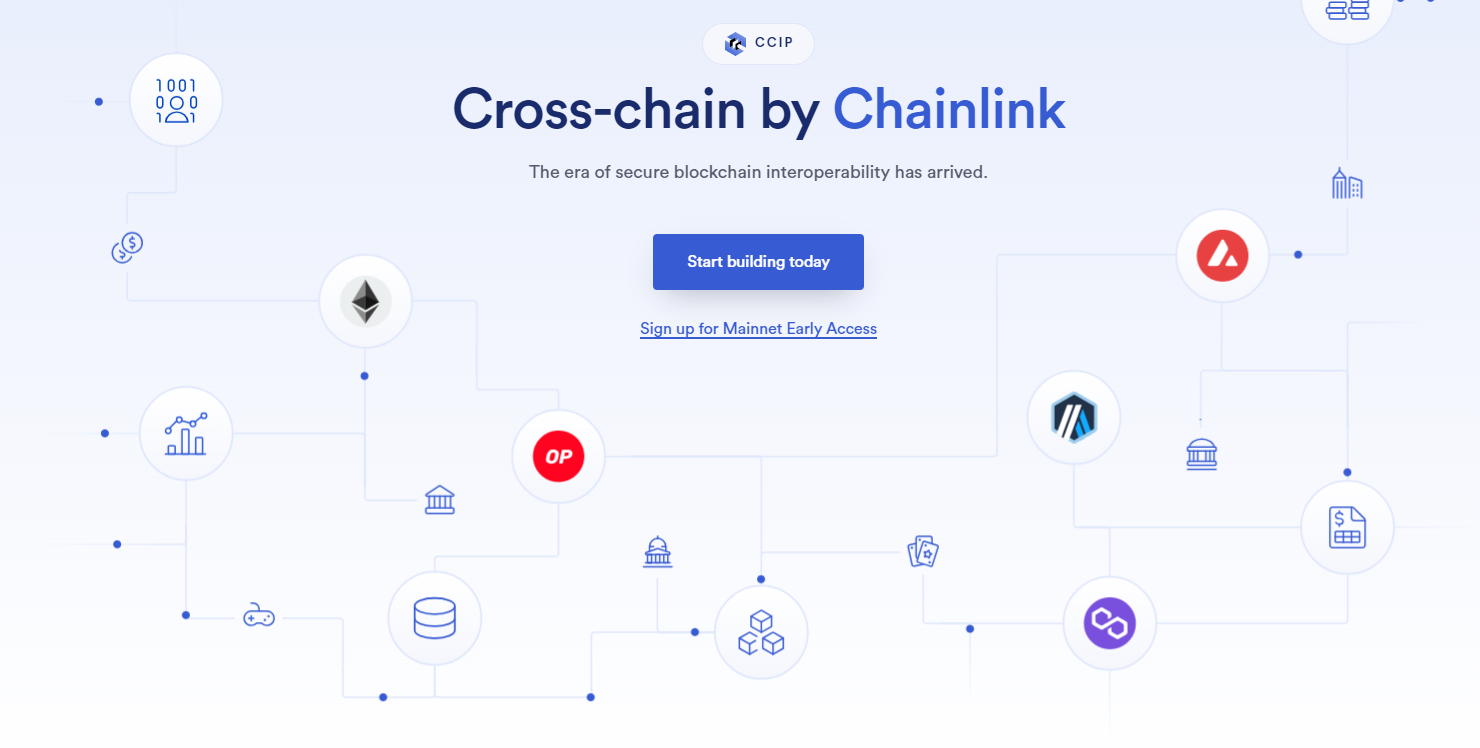Chainlink is the market-leading Oracle project, providing price data services to the DeFi market. Chainlink is providing the most reputable data source with high security. Oracle is deciding the existence and development of DeFi in the present and the future. Although there are many projects competing in this field, the leader is still Chainlink.
Chainlink was the first project to introduce Oracle, then spark the DeFi fever. Not only that, the market also knows that an upgraded product, Chainlink VRF, has pulled Gamefi into a big Trend in 2021. Whether with CCIP, Chainlink is moving towards the Omnichain trend or not, everyone will find out together in this article. article below.
To understand more about this article, people can refer to some of the articles below:
- What is Chainlink (LINK)? Overview of Cryptocurrencies Link
- What is Cross-Chain Interoperability Protocol (CCIP)? Chainlink Officially Joins the Cross-chain Wars
- What is Omnichain? Advantages and disadvantages of Omnichain
- Omnichain Name Services And New Trend For Web3 Domain Names
Chainlink’s Development History
Chainlink was founded in 2017 by Sergey Nazarov and Steve Ellis. Nazarov is a software engineer and entrepreneur with experience in the blockchain industry. Ellis is an experienced venture capitalist in the technology industry.
Chainlink has received support from several major companies, including Google, Oracle, and Deutsche Telekom. The network has also been used by several major blockchain projects, including Aave, Synthetix, and Band Protocol.
Below are some important development milestones of Chainlink:
- 2017: Chainlink was founded by Sergey Nazarov and Steve Ellis.
- 2018: Chainlink releases LINK token on Ethereum.
- 2019: Chainlink launches its mainnet.
- 2020: Chainlink launches Chainlink Keepers, a service that allows smart contracts to automatically perform real-world tasks.
- 2021: Chainlink launches Chainlink VRF, a service that provides verifiable random data for smart contracts.
- 2022: Chainlink launches Chainlink Price Feeds V2, a new version of Chainlink Price Feeds that provides more accurate and verifiable price data.
- 2023: Chainlink launches CCIPthe Omnichain bridge can connect networks to Web 2.
Chainlink Overview
Chainlink is a decentralized oracle network that allows smart contracts to reliably and securely access and use data from the real world. Smart contracts are computer programs that are stored on the blockchain and can automatically execute transactions without human intervention. However, smart contracts can only access data stored on the blockchain. Chainlink provides data from the real world to smart contracts, allowing smart contracts to be used for more use cases.
Chainlink has grown rapidly over the past few years and is now used by hundreds of blockchain projects. Projects use Chainlink to provide data to their smart contracts, such as price data, weather data, and traffic data.
Chainlink has the potential to revolutionize the way data is fed to smart contracts. The network allows smart contracts to access data from the real world reliably and securely. This makes smart contracts possible for more use cases, such as decentralized finance, insurance, and supply chain management.
Here are some benefits of using Chainlink:
- Safety: Chainlink uses a multi-source system of checks and balances to ensure that the data provided to smart contracts is accurate and trustworthy.
- Trusted: Chainlink is used by many different blockchain projects and has been tested by leading scientists.
- Transparency: Chainlink’s results are public and can be verified by anyone.
- Flexible: Chainlink can be used for many different use cases.
CCIP Overview

What is CCIP?
Cross-Chain Interoperability Protocol (CCIP) is a protocol developed by Chainlink that allows different blockchains to communicate with each other securely and efficiently. CCIP uses a number of advanced technologies, including:
- Chainlink’s decentralized oracle network: Chainlink’s decentralized oracle network provides data from the real world to smart contracts on different blockchains.
- Aggregation Technology: Aggregation technology allows smart contracts on different blockchains to access data from different sources, including other blockchains, databases, and APIs.
- Decentralized consensus mechanism: CCIP’s decentralized consensus mechanism ensures that all interconnected blockchains agree on the state of the data.
CCIP has the potential to solve several key issues related to interoperability between blockchains, including:
- Trust issues: Different blockchains have different rules and can be unreliable. CCIP uses a multi-source system of checks and balances to ensure that the data provided to smart contracts is accurate and trustworthy.
- Security matters: Different blockchains have different levels of security. CCIP uses advanced technologies to protect data transmitted between blockchains.
- Performance issues: Different blockchains have different speeds and transaction processing capabilities. CCIP uses advanced technologies to optimize the performance of data transfers between blockchains.
In case of used
- Create synthetic asset markets: CCIP can be used to create synthetic asset markets where assets from different blockchains can be traded together.
- Creating decentralized insurance services: CCIP can be used to create decentralized insurance services where insurance contracts can be executed on different blockchains.
- Creating DeFi (decentralized finance) applications: CCIP can be used to create DeFi applications where financial services such as lending and lending can be performed on different blockchains.
- Create supply chain management applications: CCIP can be used to create supply chain management applications where data from different blockchains can be aggregated and used to track goods and services service in the supply chain.
Advantages of CCIP
CCIP is at the forefront of Omnichain technology by offering a highly secure multi-chain communication solution with the decentralized Oracle network. CCIP allows fees to be paid in any type of Gas Token or its wrapped version. Ability to customize transaction completion time, allowing use in many different cases.
The most prominent feature of CCIP is the extremely large number of users and partners available from Chainlink’s Oracle service. With a project using Chainlink’s Oracle, there is a high possibility that the project will apply CCIP technology.
How Did Chainlink Predict Trends?
Chainlink Keepers and DeFi Summer 2020

In 2019, Chainlink launched its mainnet, then Chainlink launched Chainlink Keepers which is a service that allows smart contracts to automatically perform real-world tasks in 2020. With this product, Chainlink’s Oracle network can pull data from the real world automatically and quickly.
From there, smart contracts on DeFi projects can update prices or data in real time and prices are updated from both onchain and offchain. Without Oracle, there would be no DeFi market today. Applied like that, Chainlink’s Oracle created a DeFi fever, including a number of prominent projects such as Uniswap, Aave, Compound, MakerDAO,…
Chainlink VRF and GameFi Summer 2021

Together with Chainlink VRF, Axie Infinity has opened up the Play to Earn summer
Until 2021, Chainlink launches Chainlink VRF a service that provides verifiable random data for smart contracts on the Blockchain. Random data can be used for many use cases such as: Generating random in-game events, distributing rewards to players, creating unique non-fungible tokens (NFTs). cool,…
Thanks to Chainlink VRF, the Gamefi world on Blockchain was born, first Play to earn then Metavers, followed by the development of Move to earn. Although Gamefi is still simple and rudimentary, it has created a big Trend in 2021. Up to now, large investment funds are still burning a lot of money, devoting many resources to developing this field.
With CCIP Technology, Chainlink Aims for the Omnichain Trend
CCIP is not just a regular bridge, but it is multi-chain interoperable allowing projects to build Omnichain dApps. Although CCIP is introduced as an inter-chain interaction protocol, you can also understand it as Omnichain, because Omnichain will be the concept used by the market to easily distinguish it from Cross-chain and Multichain.
It is obvious, CCIP is projecting the Omnichain trend, the concept coined by LayerZero includes both Cross-chain and Multichain. Omnichain dApps are projects built on the basis of cross-chain bridges such as LayerZero, CCIP, Axelar, Womhole,… These dApps can interact with all Chains and allow Chains to interact. interact with each other through dApp. It officially ushers in the future of blockchains seamlessly interacting with each other.
The omnichain trend in the Crypto market is inevitable to solve problems related to security and especially liquidity fragmentation. As a market-leading infrastructure project, Chainlink has also been very agile in grasping this omnichain trend.
Personal Projection
Bridges are an important link in the world of multi-chain interactions. That is also the Omnichain concept, it brings many practical applications, opening a new era for the Blockchain industry. Omnichain allows native Token transfer on all Chains without liquidity, low cost and very fast speed.
Omnichain will be an array as well as a trend promoting products that allow users to interact on multi-chains, linking liquidity across all chains. It not only supports Tokens but also NFTs or more recently Domaind (domain name). In particular, CCIP allows cross-chain forwarding of Oracle data.
We need to do in-depth research on the bridges that are supporting this segment well and find projects that apply bridge technology to create products such as Lending, DEX, Farming,… Omnichain DApps and exchanges. Communication methods are keywords so you can research and find quality projects with good positions for the upcoming Trend.
Summary
Chainlink has accurately predicted Trend DeFi and Gamefi, with the recent CCIP product, Chainlink is focusing on the Omnichain segment. This will be quite a potential segment and will be a big Trend in the future. But currently this Trend is not clear, there are quite a few dApp applications that are only focusing on Lending and are still developing. With the communication protocol, it is quite clear with some big names such as LayerZero, Wormhole, Chainlink’s CCIP, Axelar, LIIFI.
Hopefully this article brings you a lot of useful information and everyone can understand why with CCIP, Chainlink is aiming for such an omnichain trend!


